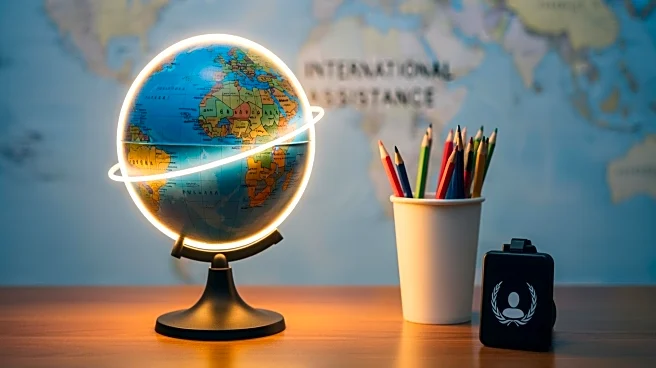What's Happening?
The European Union (EU) has announced an increase in its humanitarian aid budget to address the growing global needs resulting from both human-induced disasters and natural hazards. The EU, recognized as one of the leading donors of humanitarian aid worldwide,
has committed to a budget of €1.9 billion for 2025. This decision follows a trend of increasing humanitarian funding, with a notable 20% rise in 2022, bringing the budget to €2.62 billion. The EU's humanitarian assistance is delivered in partnership with United Nations agencies, international organizations, and non-governmental organizations (NGOs), focusing on areas such as food and nutrition, shelter, healthcare, water and sanitation, and education in emergencies. The EU's network of over 400 humanitarian experts in more than 40 countries plays a crucial role in monitoring crisis situations and coordinating relief operations.
Why It's Important?
The EU's decision to increase its humanitarian aid budget is significant as it reflects the escalating global demand for emergency assistance due to various crises. This increase in funding is crucial for maintaining and potentially expanding support for the most vulnerable populations affected by disasters. The EU's commitment underscores its role as a key player in international humanitarian efforts, providing essential resources to mitigate the impacts of crises on affected communities. The increased budget will enable the EU to sustain or enhance its support for major crises, ensuring that aid reaches those in dire need. This move also highlights the EU's dedication to upholding international humanitarian principles, emphasizing impartiality and neutrality in aid distribution.
What's Next?
As the EU continues to allocate substantial resources to humanitarian aid, it is expected to maintain its strategic partnerships with UN agencies and NGOs to effectively deliver assistance. The focus will likely remain on addressing immediate needs while also contributing to long-term recovery and development in crisis-affected regions. The EU's ongoing commitment to humanitarian aid may prompt other international donors to increase their contributions, fostering a collaborative global response to humanitarian challenges. Additionally, the EU may explore innovative approaches to enhance the efficiency and impact of its aid programs, ensuring that resources are utilized effectively to reach those most in need.
Beyond the Headlines
The EU's increased humanitarian aid budget not only addresses immediate crises but also has broader implications for global stability and security. By providing essential support to vulnerable populations, the EU helps to alleviate the root causes of migration and displacement, contributing to regional stability. Furthermore, the EU's commitment to humanitarian principles reinforces its position as a leader in promoting human rights and international cooperation. This approach may influence other regions to adopt similar strategies, fostering a more coordinated and effective global humanitarian response.
















